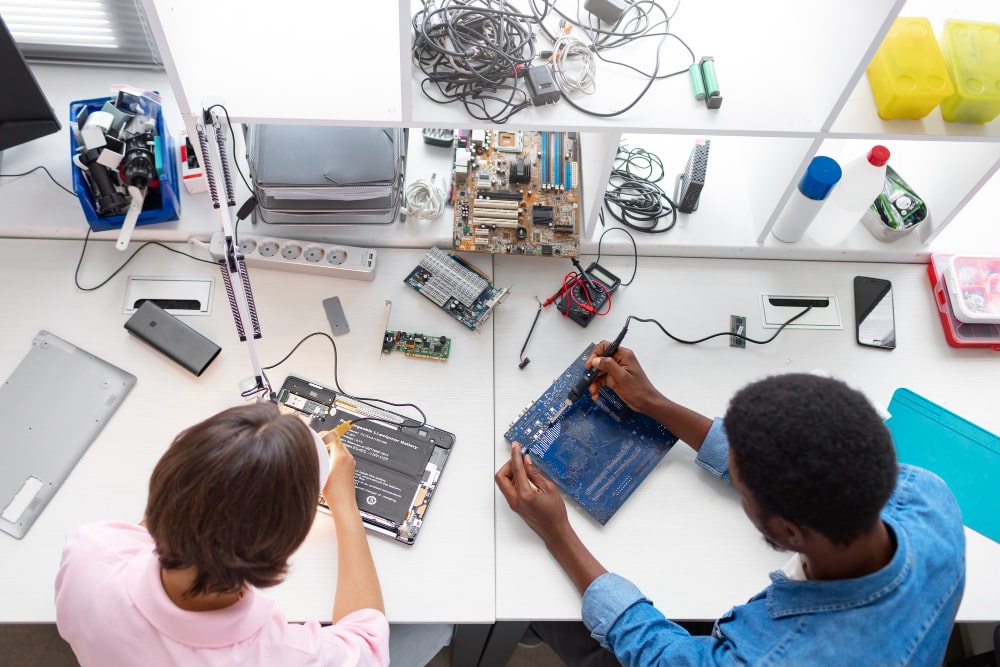Future‑Proof Your Laptop Repair Business: Top 8 Strategies for Growth
Primary Keywords: laptop repair business, future‑proof, repair trends, customer retention
Secondary Keywords: AI diagnostics, e‑commerce repairs, device diversification, SEO for repair shops
1. Keep Pace with Emerging Laptop Technology
Why It Matters: New laptop models introduce cutting‑edge hardware and proprietary chips (e.g., Apple M‑series), demanding up‑to‑date repair skills.
Continuous Training & Certification: Enroll technicians in OEM‑approved courses (Apple, HP, Dell).
Early Tech Adoption: Prepare for ultra‑thin chassis, OLED touchscreens, and ARM‑based processors.
Manufacturer Partnerships: Secure authorized‑repair agreements for genuine parts and technical guides.

2. Build a Robust E‑Commerce & Online Service Platform
Why It Matters: 70% of customers research tech services online before booking.
User‑Friendly Website & Mobile App: Offer online booking, real‑time repair tracking, and secure payment gateways.
Parts & Accessories Store: Sell genuine replacement components and DIY toolkits.
Digital Marketing & SEO:
Target keywords like “laptop repair near me” and “fast laptop screen replacement.”
Publish regular blog posts on common issues (e.g., “How to Fix Overheating Laptops”) for long‑tail SEO.
Leverage email newsletters and social media ads to drive traffic.
3. Diversify Services Across Tech Devices
Why It Matters: Expanding beyond laptops taps new revenue streams and mitigates market fluctuations.
Tablet & Smartphone Repair: Screen swaps, battery replacements, data recovery.
Gaming Consoles & Smart TVs: Board‑level repairs, lens calibrations, firmware updates.
Specialized High‑End Repairs: MacBooks, gaming rigs, and business notebooks.

4. Leverage Automation & AI‑Powered Diagnostics
Why It Matters: Automating diagnostics reduces error rates and repair cycle times by up to 40%.
AI Diagnostic Tools: Integrate software that analyzes system logs to pinpoint hardware faults.
Automated Inventory Management: Predict part demand, trigger reorder alerts, maintain optimal stock.
Robotic Assistance for Repetitive Tasks: Use robotic arms for precision screen removal or keyboard swaps.
5. Prioritize Data Security & Customer Privacy
Why It Matters: 65% of clients consider data safety a top priority when selecting a repair service.
Secure Backup Protocols: Use encrypted cloud backups before hardware work begins.
Confidentiality Agreements (NDA): Formalize privacy measures for sensitive business or personal data.
Cybersecurity Standards: Keep all diagnostic tools and workstations updated with the latest patches.

6. Enhance Customer Retention & Loyalty Programs
Why It Matters: Retaining existing customers costs 5× less than acquiring new ones.
Loyalty Points System: Award points per service, redeemable for discounts or free diagnostics.
Referral Incentives: Offer 10–20% off for both referrer and referee on next service.
Proactive Feedback Loop: Send post‑repair surveys; respond to reviews on Google My Business and Yelp.
7. Offer Remote & On‑Site Repair Services
Why It Matters: 40% of software issues can be resolved remotely, saving time and travel costs.
Remote Support Tools: Utilize TeamViewer or AnyDesk for on‑the‑spot troubleshooting.
On‑Site Emergency Repairs: Provide premium service for businesses and critical‑use clients.
Knowledge Base & Chatbot: Maintain an up‑to‑date FAQ and AI chatbot for instant answers.
8. Create Educational Content for SEO & Brand Authority
Why It Matters: Educational content ranks 3× higher and earns more backlinks.
Blog Series & Guides: “Step‑by‑Step SSD Upgrade,” “DIY Keyboard Replacement Tips.”
Video Tutorials: Short how‑to clips for common fixes posted on YouTube and embedded on your site.
Live Webinars & Q&A: Host monthly sessions on laptop maintenance best practices.

Conclusion
By integrating these eight strategies—upskilling your team, enhancing your digital presence, diversifying services, and focusing on customer experience—you’ll not only future‑proof your laptop repair business but also climb the Google rankings, attract more local searches, and build lasting customer relationships.



